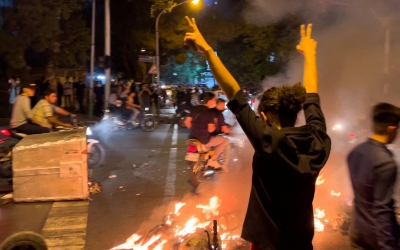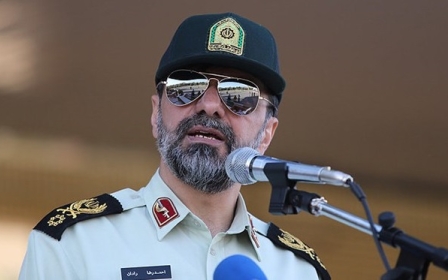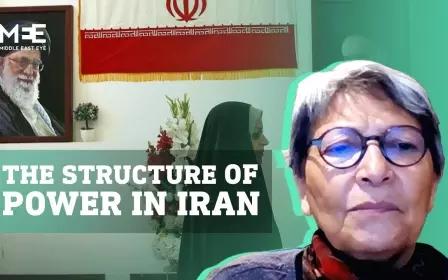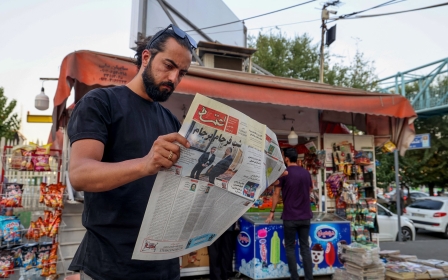Iranian press review: Conservatives offended by seeing belly buttons in public

Conservative insists on strict hijab law
The conservative politician Mohammad Hassan Ghadiri Abyaneh has expressed concerns that the hijab law in Iran is not being fully implemented following anti-establishment protests across the country last year.
"People are going to [out in] public in mini-skirts as their belly buttons and other parts of their bodies are visible," Ghadiri Abyaneh was quoted as saying by local media.
His remarks came as women who refuse to put on headscarves in public face potential arrest and prosecution.
In his criticism of those who do not follow the strict Islamic sharia law, the conservative politician added: "There are some who hug each other and kiss on the streets. Proof that this trend will continue and that some people have been recruited to demoralise sanctity."
Ghadiri Abyaneh did not elaborate or provide any proof to back up his claims.
"There should be some control. What if some people want to be nude? What if someone decides to mingle in the street? What if boys and girls decided to go on the streets in their underpants?" he said.
Ghadiri Abyaneh, who had served as Iran's ambassador in Mexico and Australia, also blamed ordinary people for the country's economic crisis.
"I believe that 15 percent of our economic issues are related to the sanctions, another 15 percent are related to mismanagement, and for the rest, the people should be blamed," he said.
"[As long as] we have one of the lowest working productivity hours... and people prefer to buy foreign products, we will continue to have economic issues."
Parliament speaker’s revolutionary claims ridiculed
Claims by Parliament Speaker Mohammad Bagher Ghalibaf during a visit to Algeria that he followed the country's revolution have prompted widespread mockery in Iran as he was only a nine-month-old baby at the time.
"As a young revolutionary, I was following the developments related to the Algerian revolution," Ghalibaf was quoted as saying in Algeria.
However, Ghalibaf was born in August 1961, and shortly afterward, in March 1962, the revolution in Algeria was concluded with a ceasefire between the French army and Algeria's National Liberation Front.
In response to his remarks, mocking comments and photoshopped images flooded Farsi social media.
"Ghalibaf claimed he followed the Algerian Revolution since he was nine-month-old, we have such prodigies, and that's why we live in this misery," wrote one Twitter user.
Other Iranian social media users posted a photoshopped mockery photo showing an infant with Ghalibaf's face and a caption that read: "Ghalibaf after hearing the news about the victory of the Algerian Revolution."
In an article, columnist Mehrdad Khadir compared Ghalibaf’s education and general knowledge with the previous parliament speakers in Iran and concluded: "The problem is not reading history. If those in power had read history, the incidents we see now would not happen."
Photos of activist's hunger strike spark outcry
Two photos of the emaciated-looking Iranian physician Farhad Maysami, who is being held in the Rajaei Shahr prison, have caused an enormous reaction, with many activists and politicians urging him to end his hunger strikes.
In the photos, Maysami looks extremely thin following several hunger strikes and political fasts. In September, he announced a 10-day hunger strike in solidarity with Iranians suffering from a crackdown by authorities and in opposition to capital punishment in the country.
In a letter, he said he had reduced his daily food consumption and demanded the release of political prisoners.
On its front page on 5 February, the Etemad daily praised Maysami under the headline: "An activist with his bones visible."
Due to pressures on independent media, the daily only wrote about Maysami's background and current situation.
"The photos tell us about him. His face is just the skin that covers his skull and jaw; the veins are visible underneath the skin of his head; his clavicle bones and ribs can be seen; nothing is left of his arms but veins and bones," wrote the daily.
Meanwhile, several jailed political prisoners and journalists have urged him to end his political fasting in separate messages.
Maysami was arrested in 2018 for his opposition to the obligatory hijab. A branch of the Islamic Revolutionary Court accused him of "propaganda against the establishment" and sentenced him to five years in prison.
Calls for accountability for 1988 massacre
On the 44th anniversary of the 1979 Islamic revolution in Iran, Amnesty International on Monday urged the international community to bring to account the diplomats who assisted Iran in covering up the 1988 massacre of leftist political prisoners.
The rights group accused former Iranian diplomats of denying the killings, spreading misinformation, and opposing an international investigation into the mass killing of thousands of political prisoners between August and December 1988.
"Amnesty International has documented evidence pointing to the involvement of various former diplomatic representatives and government officials in the cover-up, including Iran's then permanent representative to the UN in New York, Mohammad Jafar Mahallati," read the statement.
Mahallati is now the Nancy Schrom Dye chair in Middle East and North African studies at Oberlin College, Oberlin, Ohio, USA.
Amnesty also named Iran's former permanent representative to the UN in Geneva, Sirous Nasseri; the former charge d'affaires in Ottawa and London, Mohammad Ali Mousavi and Mohammad Mehdi Akhoundzadeh Basti; former minister of foreign affairs, Ali Akbar Velayati; and his deputies, Mohammad Hossein Lavasani and Manouchehr Mottaki, among other diplomats who the rights group says assisted in covering up the massacre.
Amnesty International urged the former diplomats to "fully disclose what they knew about the mass extrajudicial executions of 1988, how the cover-up was coordinated and conducted".
*Iranian press review is a digest of news reports not independently verified as accurate by Middle East Eye.
Middle East Eye delivers independent and unrivalled coverage and analysis of the Middle East, North Africa and beyond. To learn more about republishing this content and the associated fees, please fill out this form. More about MEE can be found here.






